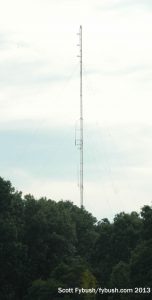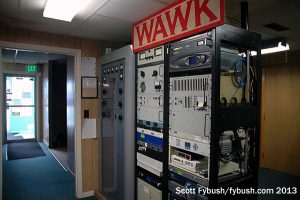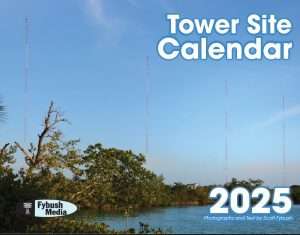NorthEast Radio Watch 12/23 & 12/30/2024: WKIT Lives!
In this week’s issue… WKIT finds a buyer - Eskin out at WIP - Staff shifts in Utica - CRTC approves Bell divestitures
Text and photos by SCOTT FYBUSH
In traveling and photographing for this column, we spend a lot of time in big-market radio stations. And, nothing against big stations, but a lot of them look a lot alike these days. There are, after all, only so many ways you can consolidate six or seven or eight stations’ worth of studios in modern office space in a way that fits in a typical cluster’s cap-ex budget, and I think we’ve seen all of them by now.


Which is why we always take advantage of a chance to visit the little guys, too – and in this week’s installment, we’ll show you three nifty small-market operations, each with its own niche in its own corner of Indiana.
The town of Knox, 3600 people strong, sits in north-central Indiana about 45 minutes southwest of South Bend and 90 minutes or so southeast of Chicago. It was pretty late to the radio game: it wasn’t until 1965 that some local folks got together to try to bring something more local to town than the Chicago AMs (and more recently, South Bend FMs) that made up the dial until then.
There wasn’t much room left on the AM dial, so WKVI in Knox signed on first on the FM side, as a class A signal on 99.3 on July 21, 1969. (A day earlier and they’d have had a great news story to kick off their inaugural broadcast!)
WKVI-FM’s AM sister, a 250-watt daytimer on 1520, came along a couple of years later, and their current studio home was built later in the 1970s just south of downtown Knox, about two miles south of the shared AM-FM tower north of town.
When we visited in the summer of 2013, WKVI (that’s “Kankakee Valley Indiana”) had just recently separated its AM and FM programming: after Tom Berg’s morning show (that’s Tom above at left), the two signals split for the rest of the day, with FM doing AC as “K99.3” and AM doing “Kountry KVI.”
The cozy WKVI studio building was on the verge of more changes when we stopped by: while WKVI’s programming was coming from a pair of small studios down the hallway on one side of the building, the bigger studio right in the middle was mostly empty and awaiting renovation to add a third signal to this cluster. That’s WYMR (98.3), licensed to nearby Culver, and it began testing at the very end of 2014 with an official sign-on set to happen very soon now.
Later in 2013, we added another Indiana-licensed 1520 signal to our list with a stop in Shelbyville, just southeast of Indianapolis. WSVL signed on right here in this spot on North Morristown Road, off Route 9 north of town, in 1961, with 250 watts (daytime only, of course!) into a three-tower array. After just three years on the AM dial, it spawned WSVL-FM on 97.1, which eventually moved in to Indianapolis as one of Emmis Communications’ first big holdings. (It was later known as WENS and is today “Hank FM” WLHK, still licensed to Shelbyville but very much an Indianapolis station.)
Back home in Shelby County, the AM station went through new incarnations as WOOO and WKWH (owned by the local electric company, hence the power-related callsign), moved its studios out to Rushville, 15 miles to the east, and then fell silent for a while before being sold to present owner 3 Towers Broadcasting Company in 2007. The 3 Towers guys reopened the Shelbyville studio and renamed the station WSVX.
“3 Towers,” of course, referred to the directional array that by then put out 1000 watts day, 250 watts at night in a very tight north-south beam that missed much of the exurban growth along I-74 that now links Shelbyville to the Indianapolis metro 25 miles or so away. The licensee name became sadly ironic in early 2011 when a winter ice storm took down one of the three towers – but by then it didn’t matter so much, because WSVX had become an early adopter of AM-on-FM translators. W243CL (96.5) was already in place on one of the towers that remained, and WSVX decided to focus on the translator, taking down another tower and reducing AM 1520 to 250 watts by day and just 4 watts after dark.
The layout here is as simple as it can be: visitors drive down the road into the big WSVX property and walk into a big, comfy lobby complete with an overstuffed leather sofa and free coffee. The lobby connects to the hallway that runs the length of the building, and it looks right into the big air studio on one side of the hallway, which in turn looks into a transmitter room at the back of the building. The original Collins phasor is still here, at least for show, with two generations of Harris transmitters next to it. (Look carefully in the bottom of the rack to the right of the current Gates One AM transmitter and you’ll see the Indiana-proud Crown FM transmitter for the 96.5 translator.)


Our last stop this time around is lower on the dial now, but it didn’t start that way.
Kendallville, 35 miles north of Fort Wayne, gained its own hometown radio outlet in 1955 when WAWK signed on at 1570 on the dial, with calls honoring both Kendallville and nearby Auburn. The 1960s brought a move down to its present 1140 spot (still as a daytimer) and the addition of WAWK-FM on 93.3.
As with Shelbyville, that class B FM succumbed to the swan song of the big city down the road: by the 1980s, it had become WBTU and was playing country from Fort Wayne studios.
But the AM station stayed in local hands (paired, for quite a while, with the local cable company, which shared its building on East Avenue just off US 6). Like WSVX, WAWK returned to the FM dial with a translator, and these days the classic rock of “The Hawk” is heard both on AM 1140 and more prominently on the 24-hour FM voice of W238BH (95.5), transmitting from the AM tower out back. And like WSVX, there’s still some lovely old gear in the WAWK transmitter room adjacent to the air studios: that old Gates transmitter still runs as a backup to the Energy-Onix Pulsar solid-state AM transmitter in the rack next to it. (The translator, in the rack on the right, is also Energy-Onix.)
Thanks to WKVI’s Tom Berg, WSVX’s Scott Huber and WAWK’s John O’Rourke for the tours!

Behold, the 2025 calendar!
We chose the 100,000-watt transmitter of the Voice Of America in Marathon, right in the heart of the Florida Keys. This picture has everything we like in our covers — blue skies, greenery, water, and of course, towers! The history behind this site is a draw, too.
Other months feature some of our favorite images from years past, including some Canadian stations and several stations celebrating their centennials (can you guess? you don’t have to if you buy the calendar!).
We will ship daily through Christmas Eve. Place your order now for immediate shipping!
This will be the 24th edition of the world-famous Tower Site Calendar, and your support will determine whether it will be the final edition.
It’s been a complicated few years here, and as we finish up production of the new edition, we’re considering the future of this staple of radio walls everywhere as we evaluate our workload going forward.
The proceeds from the calendar help sustain the reporting that we do on the broadcast industry here at Fybush Media, so your purchases matter a lot to us here – and if that matters to you, now’s the time to show that support with an order of the new Tower Site Calendar. (And we have the new Broadcast Historian’s Calendar for 2025 ready to ship, too. Why not order both?)
Visit the Fybush Media Store and place your order now for the next calendar, get a great discount on previous calendars, and check out our selection of books and videos, too!
Next week: A few stops in Indianapolis
In this week’s issue… WKIT finds a buyer - Eskin out at WIP - Staff shifts in Utica - CRTC approves Bell divestitures
In this week’s issue… WBUR backs off local talk - EMF's expansion in NY, nationally - Rochester broadcasters honored - Russell finds new PA radio home - Remembering Bruce Stevens - The new calendar's here!
In this week’s issue… Remembering WNY's Palvino, Harris - Will King sell Bangor stations? - Kay moves earlier - New signal on LI - Cumulus cuts hit PA, New England - Frizzell sells in NH
In this week’s issue… Saluting a small-town radio vet - Bell moves CP24 - Scott heads west - Burlington gets Air 1, "Experimental Radio" - Family Life heads down I-86